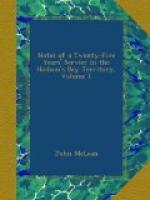CHAPTER VIII.
GENERAL REMARKS.
CLIMATE OF UNGAVA—AURORA
BOREALIS—SOIL—VEGETABLE
PRODUCTIONS—ANIMALS—BIRDS—FISH—GEOLOGICAL
FEATURES.
It need scarcely be observed that, in so high a latitude as that of Ungava, the climate presents the extremes of heat and cold; the moderate temperature of spring and autumn is unknown, the rigour of winter being immediately succeeded by the intense heat of summer, and vice versa.
On the 12th of June, 1840, the thermometer was observed to rise from 10 deg. below zero to 76 deg. in the shade, the sky clear and the weather calm; this was, in fact, the first day of summer. For ten days previously the thermometer ranged from 15 deg. below zero to 32 deg. above, and the weather was as boisterous as in the month of January, snowing and blowing furiously all the time. The heat continued to increase, till the thermometer frequently exhibited from 85 deg. to 100 deg. in the shade. This intense heat may, no doubt, be owing in a considerable degree to the reflection of the solar rays from the rocky surface of the country, a great part of which is destitute of vegetation. When the wind blows from the sea the atmosphere is so much cooled as to become disagreeable. These vicissitudes are frequently experienced during summer, and are probably caused by the sea’s being always encumbered by ice. It is remarkable that the severest cold in this quarter is invariably accompanied by stormy weather; whereas, in the interior of the continent, severe cold always produces calm.
The winter may be said to commence in October; by the end of this month the ground is covered with snow, and the rivers and smaller lakes are frozen over; the actions of the tide, however, and the strength of the current, often keep Ungava River open till the month of January. At this period I have neither seen, read, nor heard of any locality under heaven that can offer a more cheerless abode to civilized man than Ungava. The rumbling noise created by the ice, when driven to and fro by the force of the tide, continually stuns the ear; while the light of heaven is hidden by the fog that hangs in the air, shrouding everything in the gloom of a dark twilight. If Pluto should leave his own gloomy mansion in tenebris tartari, he might take up his abode here, and gain or lose but little by the exchange.
“The parched ground burns frore,
and cold performs
The effect of fire.”—MILTON.
When the river sets fast, the beauties of the winter scene are disclosed—one continuous surface of glaring snow, with here and there a clump of dwarf pine, of the bald summits of barren hills, from which the violence of the winter storms sweep away even the tenacious lichens. The winter storms are the most violent I ever experienced, sweeping every thing before them; and often prove fatal to the Indians when overtaken by them in places where no shelter can




